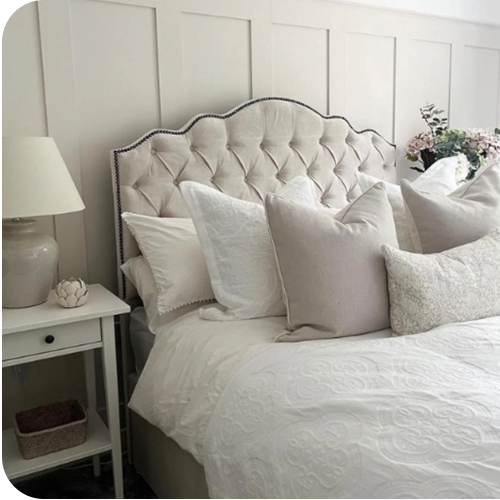Why a Headboard is More Than Just Decoration
A headboard, often regarded as a decorative element in a bedroom, transcends its primary function of ornamentation. While it undoubtedly contributes to the aesthetic appeal of a bedroom, its significance surpasses mere decoration. Let’s delve into why a headboard holds a multifaceted role in your bedroom beyond its visual allure.
Table of contents
Definition of a Headboard
A headboard refers to the vertical panel attached to the head of a bed frame. Initially serving a practical purpose of insulating sleepers from drafts, it has evolved into an integral part of bedroom design.
Evolution of Headboards

From their utilitarian origins to becoming a focal point in interior design, headboards have undergone a transformation. Their evolution mirrors the evolving preferences and needs of individuals concerning their living spaces.
Aesthetics and Design
A headboard isn’t solely about enhancing the aesthetics of a bedroom. It acts as a defining element, anchoring the room’s design. Whether it’s a grand, upholstered headboard or a minimalist wooden frame, the choice significantly impacts the ambiance of the space.
Practical Benefits

Beyond aesthetics, headboards provide substantial practical benefits. They offer a comfortable surface for sitting up in bed, provide insulation, and reduce noise by acting as a barrier against the wall. Moreover, they prevent pillows from slipping down and protect the wall from wear and tear.
| Practical Benefit | Explanation |
| Comfortable Support | Headboards provide a comfortable surface for sitting up in bed, allowing for relaxation, reading, or other activities. |
| Insulation | They act as a barrier between the bed and the wall, offering insulation and helping to maintain a comfortable temperature. |
| Noise Reduction | By serving as a buffer against the wall, headboards can reduce noise transmission, creating a quieter sleeping environment. |
| Pillow Stability | Headboards prevent pillows from slipping down behind the bed, ensuring better support and alignment during sleep. |
| Wall Protection | They protect the wall from wear and tear caused by the constant contact with pillows, hair oils, and movements during sleep. |
Psychological Effects
The presence of a headboard can have a profound psychological impact. It creates a sense of comfort and security, influencing sleep quality and contributing to an emotionally comforting bedroom environment.
Customization and Personalization

Modern headboards offer diverse options for customization, allowing individuals to personalize their spaces. From DIY projects to customizable options in the market, headboards enable one to express their unique style and preferences.
Maintenance and Care
Proper maintenance ensures the longevity of a headboard. Regular cleaning and material-specific care are essential to preserve its aesthetics and functionality. Knowing how to maintain different headboard materials is crucial for their durability.
Wood Headboards:

- Dusting: Regularly dust with a soft, dry cloth to remove debris and prevent buildup.
- Polishing: Use a wood-specific polish occasionally to maintain shine and protect the finish.
- Avoid Moisture: Keep away from excessive moisture to prevent warping or damage.
- Protective Pads: Use felt pads behind the headboard to prevent scratches against the wall.
Upholstered Headboards:
- Vacuuming: Use a soft brush attachment to gently vacuum the fabric to remove dust and particles.
- Spot Cleaning: Promptly attend to spills or stains using a mild detergent or upholstery cleaner.
- Avoid Harsh Chemicals: Test any cleaning solutions on a hidden area first to ensure they won’t damage the fabric.
- Rotation: Rotate the mattress regularly to minimize wear on the headboard’s fabric.
Metal Headboards:
- Dust Removal: Wipe regularly with a soft cloth to remove dust and prevent buildup.
- Metal Polish: Use a metal-specific polish to maintain shine and prevent corrosion.
- Avoid Scratches: Prevent scratches by using gentle cleaning tools and avoiding abrasive materials.
- Check for Rust: Periodically check for signs of rust or corrosion, especially in humid environments.
Conclusion
In conclusion, a headboard isn’t merely a decorative piece but an integral element that affects various aspects of a bedroom. Its role extends from aesthetics to practicality, psychology, and personalization, making it a significant consideration in bedroom design.
Readmore:
Choosing the Right Headboard for Your Bedroom Style and Needs
How to Attach a Headboard to a Wall: Transforming Your Bedroom
How to Hang a Headboard on a Wall: Elevate Your Bedroom Decor
FAQs
Do all beds need a headboard?
Not necessarily, but a headboard does offer practical and aesthetic benefits.
Can I make my own headboard?
Absolutely! DIY headboards are a great way to personalize your bedroom.
Do headboards affect sleep quality?
They can contribute positively by creating a more comfortable and secure environment.
What materials are commonly used for headboards?
Wood, metal, upholstered fabric, and rattan are popular choices for headboard materials.



